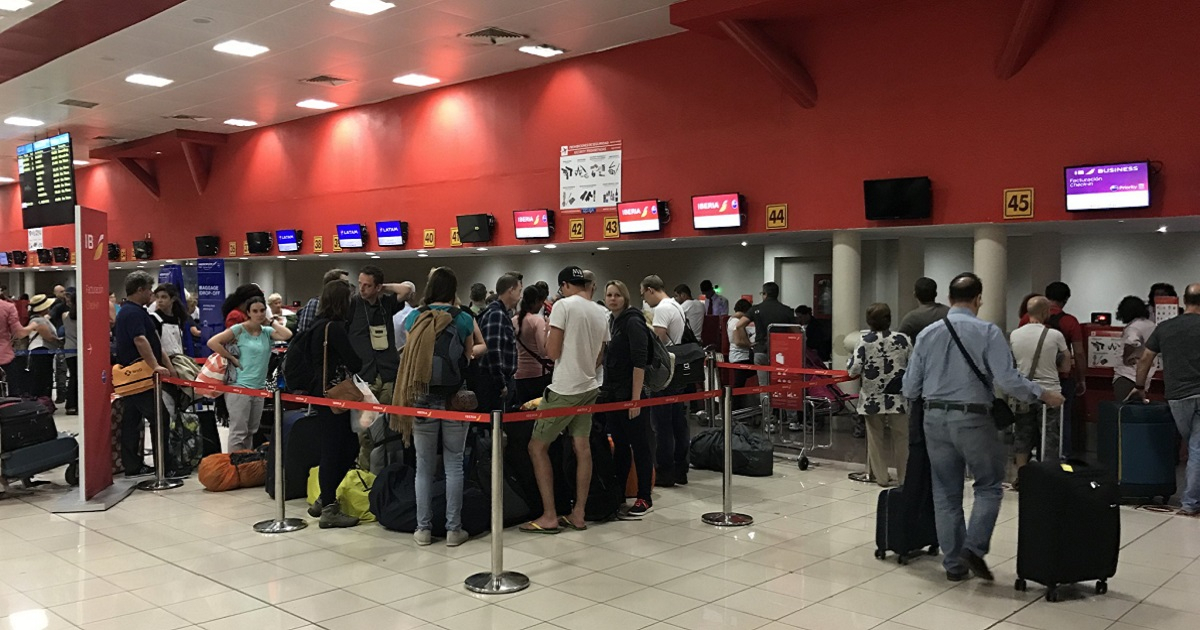Marcos, a 32-year-old Cuban who chose to follow legal pathways to migrate to the United States, has seen his family reunification process come to a halt after patiently waiting for nine years. He had been eagerly anticipating a reunion with his father in the U.S. through an F2B visa. However, just as he was scheduled for an appointment at the U.S. Embassy in Havana, President Donald Trump's new proclamation froze everything.
This story, reported by the Spanish newspaper El País, illustrates the severe impact of the recent entry ban on citizens from 12 countries, including Cuba, on thousands of Cuban families. Marcos, whose name has been changed to protect his legal status, represents many who are affected by this policy shift.
"Everyone is devastated. Nine years of their lives suddenly seem meaningless," expressed Mabel Cuesta, a friend of Marcos and an academic based in Houston. Although his visa was approved during the consular interview, the issuance of the document remains suspended.
Impact of Trump's Immigration Policy
Starting this past Monday at 12:01 a.m., Trump's new immigration restriction, affecting both non-immigrant visas (such as B-1/B-2, F, M, and J) as well as those in the legal immigration process, has placed many in a state of uncertainty. The Republican administration claims this measure addresses "national security concerns" and criticizes Cuba for allegedly failing to provide consular information and accept deportations.
The President once again labeled Cuba as a "state sponsor of terrorism" and justified the ban citing supposed "visa overstays" by Cuban nationals. This decision has been perceived as a betrayal by the largely Republican-voting Cuban American community, as noted by the Spanish newspaper.
Voices of Opposition
"Since taking office, this president has done nothing but marginalize the most vulnerable segments of the Cuban American family; it's another betrayal," stated Cuesta. María José Espinosa, Executive Director of the Center for Engagement and Advocacy in the Americas (CEDA), described the ban as an "arbitrary and deeply cruel" measure. She emphasized that it punishes thousands with valid visas, who have no criminal history, many of whom intend only to visit family or study in the U.S.
"These individuals hold visas valid for five years. They are law-abiding citizens who come to the U.S. for family visits or to participate in academic, commercial, and cultural exchanges," Espinosa told El País. The proclamation has sparked anxiety and uncertainty: a Cuban student with a scholarship for a Ph.D. at the University of Pennsylvania confessed to living in constant fear that her entry might be denied despite having an approved visa.
Legal and Emotional Uncertainty
"Nothing guarantees entry, even with a visa. Being a Cuban citizen puts you in a position of absolute vulnerability," she lamented. Although the proclamation states that those with already issued visas may retain them, State Department spokespersons have caused confusion by suggesting that even those individuals might not be able to travel while the order is active.
"It's a legally confusing but emotionally devastating proclamation," Espinosa concluded. The new immigration proclamation signed by Donald Trump has raised alarms among thousands of Cuban families awaiting reunification or planning trips to the United States. This executive order imposes restrictions on citizens from 19 countries, and although the limitation for Cuba is partial, its consequences are severe.
The island was included among the countries flagged for alleged non-cooperation in security matters and repatriation of nationals, leading to the suspension of tourist, study, business, and exchange visas, and hindering ongoing immigration processes. Under this new policy, only immediate family members of U.S. citizens—such as parents, spouses, and minor children—are exempt from the suspension. In contrast, processes managed by permanent residents, like those of many Cubans who have waited years to reunite with loved ones, have been indefinitely stalled.
Human rights organizations and legal experts have condemned the measure's impact, noting that even those with approved visas might face consular obstacles or be denied at entry points. The proclamation also creates confusion regarding its practical application. While the State Department clarified that visas issued before its enactment would remain valid, they warn that the final decision on entry rests with immigration officers. This discretion heightens uncertainty, leaving many in an unprecedented migratory limbo.
Attorneys and activists advise Cubans to carefully review their status and seek legal advice to avoid unintentional violations. Within the Cuban community, reactions have been marked by distress, anger, and profound disillusionment. Testimonies collected by national media demonstrate how this policy has shattered the hopes of thousands of families, especially those who had already navigated the lengthy stages of a legal and costly immigration process.
According to analysts and specialized reports, the so-called "travel ban 2.0" is not merely an administrative measure but an additional barrier in the long journey toward family reunification.
Frequently Asked Questions About Trump's Visa Ban Impact on Cubans
Why was the visa process for Cubans halted by Trump's administration?
The Trump administration cited "national security concerns" and Cuba's alleged failure to provide consular information and accept deportations as reasons for halting the visa process.
Who is exempt from the visa suspension?
Immediate family members of U.S. citizens, such as parents, spouses, and minor children, are exempt from the visa suspension.
What should affected individuals do in response to the visa ban?
Affected individuals are advised to carefully review their status and seek legal advice to avoid unintentional violations of U.S. immigration policies.
